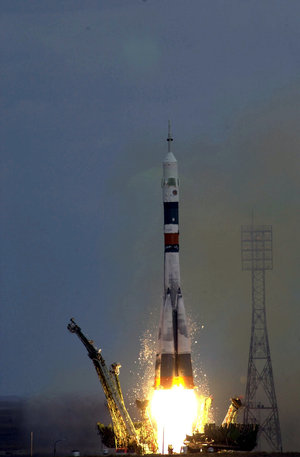Day 4: Wednesday 24 October 2001
Having arrived at the International Space Station on Tuesday, today the Andromède crew made a start on their busy schedule of scientific experiments.
For ESA astronaut Claudie Haigneré, the main focus was the COGNI experiment (Cognitive Process for 3-D Orientation Perception and Navigation in Weightlessness). Although a problem with the keypad, which is still to be solved, delayed part of the experiment.
The COGNI experiment looks to better understand how the brain uses gravity in the process of perceiving and representing three-dimensional space. All three members of the Andromède crew are involved in this experiment in which they are required to look at computer-generated images and then indicate what they have seen.
Measurements, which will be taken twice in-flight, will be compared with those taken on the ground before and after the mission and so help the scientists gain an understanding of how the brain adapts to an environment that is free from the pull of gravity.

Another stage of the Aquarius experiment was conducted today. Aquarius explores the earliest development of amphibians and yeast in the absence of gravity. Another experiment undertaken was Cardioscience, which will investigate the cardiovascular deconditioning phenomenon experienced under microgravity conditions, a condition that can amongst other things make the astronauts' return journey to Earth uncomfortable.
COGNI and Aquarius are just two of the experiments that are being conducted on the ISS in conjunction with school children and university students as part of an educational project.















 Germany
Germany
 Austria
Austria
 Belgium
Belgium
 Denmark
Denmark
 Spain
Spain
 Estonia
Estonia
 Finland
Finland
 France
France
 Greece
Greece
 Hungary
Hungary
 Ireland
Ireland
 Italy
Italy
 Luxembourg
Luxembourg
 Norway
Norway
 The Netherlands
The Netherlands
 Poland
Poland
 Portugal
Portugal
 Czechia
Czechia
 Romania
Romania
 United Kingdom
United Kingdom
 Slovenia
Slovenia
 Sweden
Sweden
 Switzerland
Switzerland






























